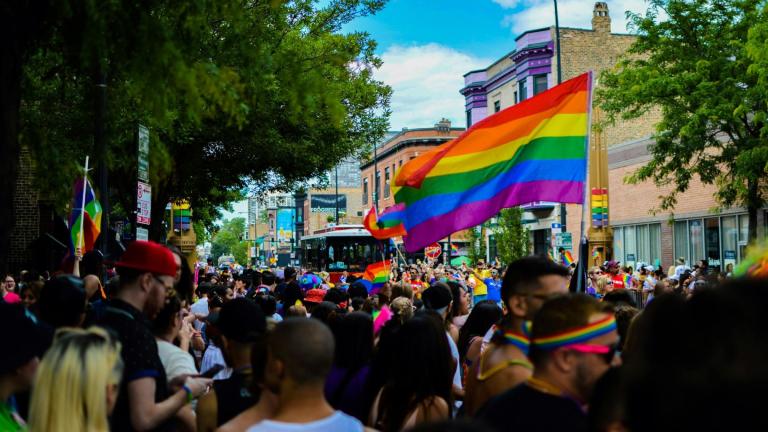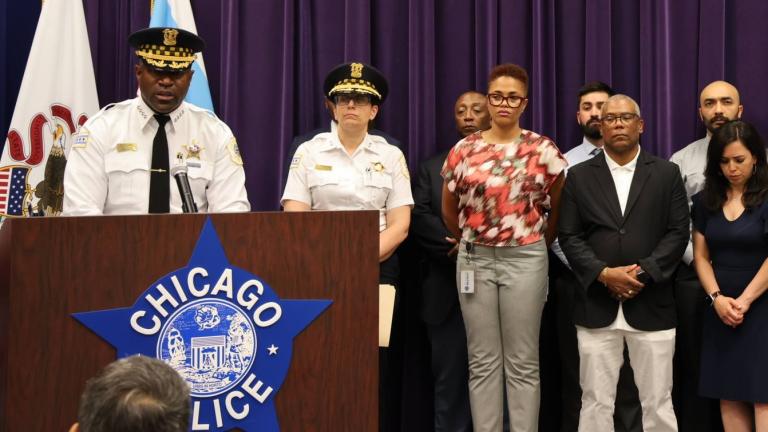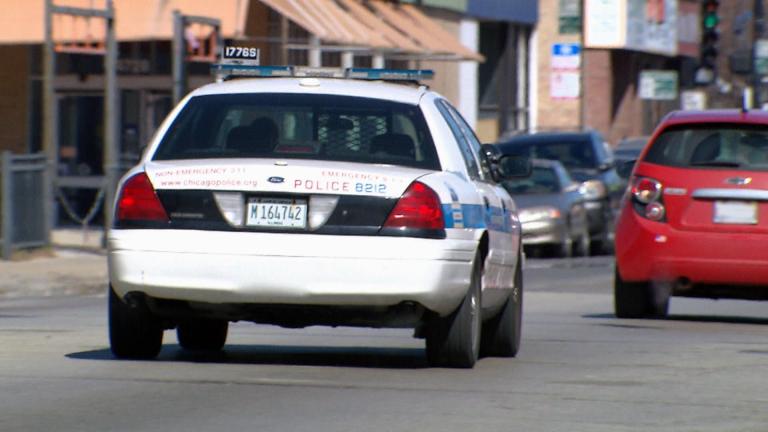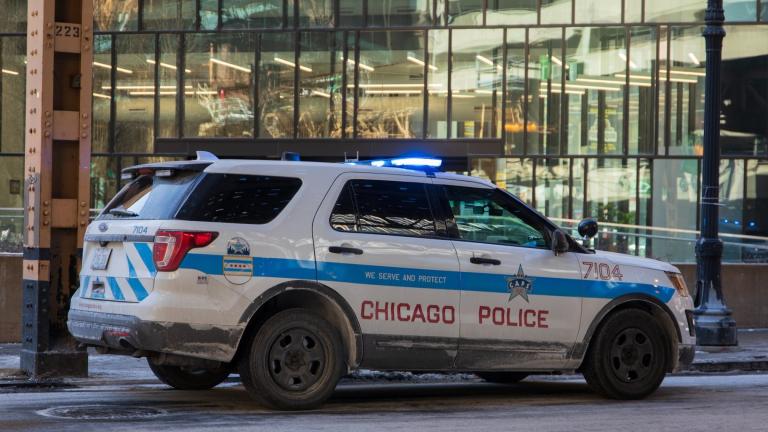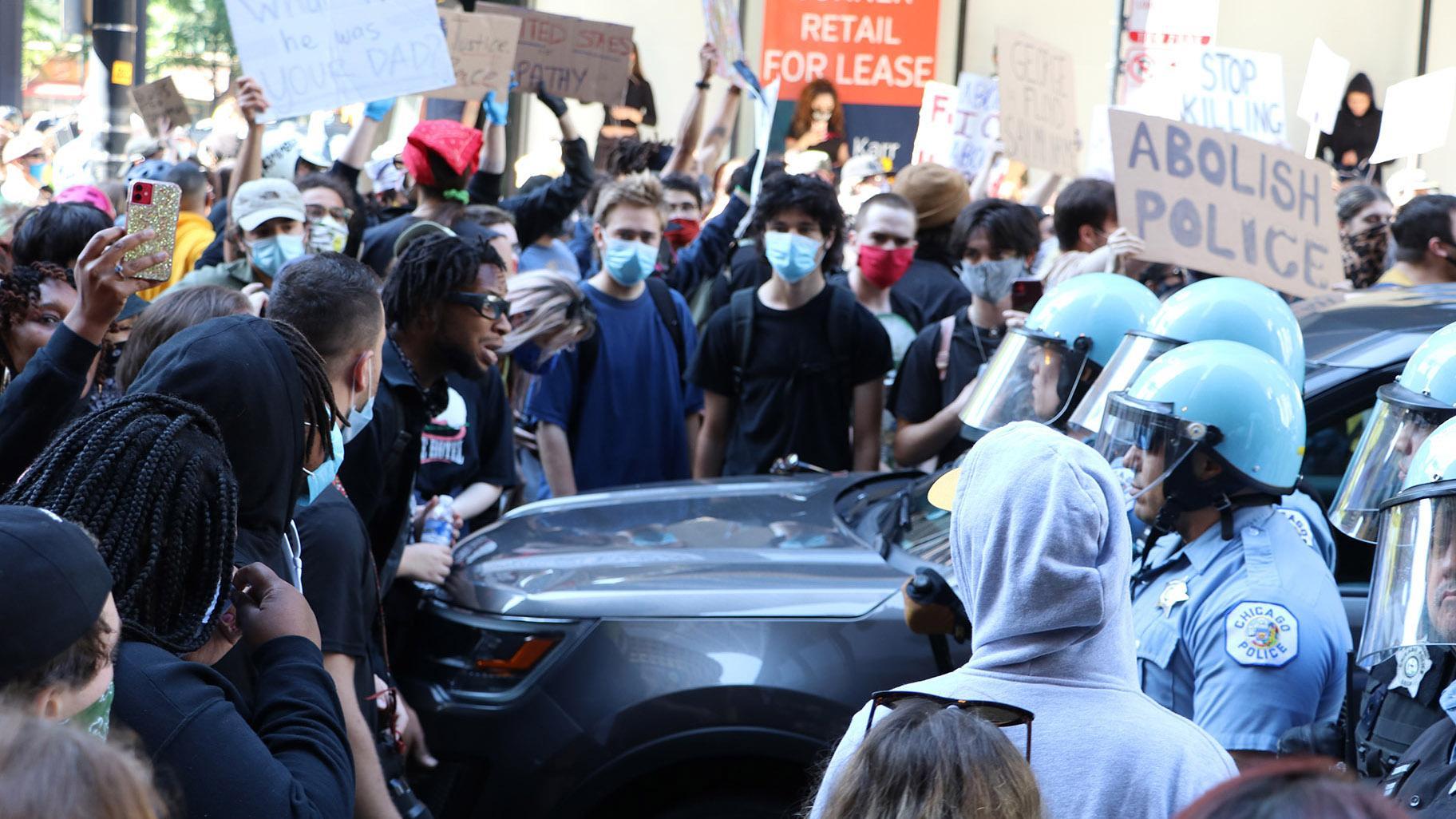 Protesters and police officers wearing riot gear have a standoff near Daley Plaza on Saturday, May 30, 2020. (Evan Garcia / WTTW News)
Protesters and police officers wearing riot gear have a standoff near Daley Plaza on Saturday, May 30, 2020. (Evan Garcia / WTTW News)
Chicago Police Department officials have significantly changed their plan to handle protests during the Democratic National Convention in response to objections lodged by police reform groups against a policy that would allow mass arrests, officials said.
The coalition of police reform groups behind the consent decree, the federal court order requiring CPD to change the way it trains, supervises and disciplines officers, told a federal judge that the original policy designed to give officers the power to make mass arrests of protestors violated the First Amendment. The new policy includes significant changes, officials told WTTW News.
CPD officers will now be required to take additional steps to protect the First Amendment rights of protestors and “remain unbiased and opinion neutral in any communication with individuals within the crowd while affirming that the First Amendment rights of lawful participants are protected.”
Officers will be prohibited from arresting those engaged in First Amendment protests for “minor or petty offenses … or for actions that pose no immediate threat to the safety of the community, or others, or of causing property damage,” according to the revised policy.
Read the full revised policy here.
Chicagoans have until June 30 to weigh in on the new draft of the policy, which has not yet been finalized, even though the convention is less than two months away.
Alexandra Block, director of the Criminal Legal System and Policing Project at the ACLU of Illinois, who represents the coalition, said the revised policy represents a “substantial improvement” over the original policy, even though concerns remain.
“The coalition does not endorse this policy,” Block told WTTW News on Friday, in advance of a formal summary of their response to the new policy being filed next week with the federal judge overseeing the consent decree. “But it is a policy that we made better.”
Protestors can only be arrested as a last resort, when police have evidence that their actions pose an immediate threat to the lives of others or may cause property damage, according to the policy.
For example, a group of protesters could face arrest if they choose to block access to a hospital, because that could threaten public safety, Block said. But those who engage in protests that pose no such threat may not be arrested, even if they do not follow police directives, according to the policy.
In addition, only specific protestors who pose a threat to people or property can be arrested — not everyone participating in the protest, according to the new policy.
That should reduce the need for Chicago police to make mass arrests during protests, Block said.
">Mayor Brandon Johnson and Chicago Police Supt. Larry Snelling have repeatedly said "that Chicago police officers are prepared to lawfully police the massive protests expected to erupt around the United Center and downtown under the white-hot media glare the convention is sure to trigger.
Snelling has promised officers will be better prepared to handle protests around the convention than they were when demonstrations and unrest triggered by the police murder of George Floyd erupted in May 2020, when officers failed to protect the constitutional rights of thousands of Chicagoans, according to two probes, one by the independent monitoring team charged with determining whether the city is making good on its promises of reform and one by the city’s inspector general.
“Our officers will be ready, disciplined and trained to deal with those situations,” Snelling said June 6. “We want people to have their voices heard. The Chicago Police Department, we do not get political when it comes to this. Our job is public safety and we want to make sure that we keep the public safe.”
The potential of violent protests marring the 2024 convention is especially fraught because of condemnation of President Joe Biden’s support for Israel in its war against Hamas in Gaza.
Massive anti-Vietnam War protests outside the 1968 Democratic National Convention triggered a police riot, highlighting the party’s split over the war, and helping to elect former President Richard Nixon. Those images indelibly stained Chicago’s reputation as a home for political conventions.
When the Democratic National Convention returned to Chicago in 1996, it was peaceful, helping to boost former President Bill Clinton’s reelection bid.
The revised policy would not require officers to document every time they used force against a member of the public. The original policy required documentation only if someone is injured, a provision that violated the consent decree, according to the coalition.
In addition, the revised policy bans “kettling,” the confinement by police of a group of demonstrators or protesters in a small area, as a method of crowd control.
The revised policy also ensures that credentialed members of the news media will not be required to disperse if police officials order a First Amendment assembly to disperse.
The revised policy was released approximately 10 days after Inspector General Deborah Witzburg released a report outlining “persistent concerns” officers are prepared to lawfully police protests expected to erupt around the convention.
Witzburg said she was particularly concerned CPD officials have already been training officers on these yet-to-be finalized policies, a concern Block said she shared with less than two months to go before the convention takes place Aug. 19-22.
“That is a problem of CPD’s own making,” Block said. “All of this could have been avoided.”
Contact Heather Cherone: @HeatherCherone | (773) 569-1863 | [email protected]
A Safer City is supported, in part, by the Sue Ling Gin Foundation Initiative for Reducing Violence in Chicago.

